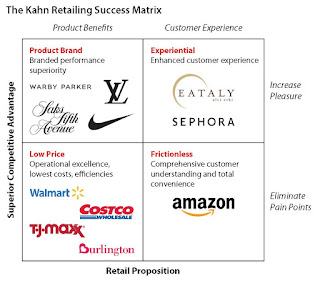User Experience (UX)
Excellent end of term meeting today, ABC! We had a lively discussion about User Experience (UX), eliciting our own opinions about certain companies, how they operate, and what it is that makes us eager to continue consuming. We then set out to explore what makes good user experience, and what a company should do in order to achieve such.
User Experience is about the interaction of a customer with a company's product, and whether their experience was pleasant, manageable, satisfactory and frictionless. Companies that focus on developing such user experience are very "customer-centric", focusing on generating a good experience for the customer. We discussed how a company first needs to develop a worthwhile product that a customer will want and be happy with, and then focus on enhancing their experience. No matter how good a customer's experience is, if the product is not of worth to people, the whole endeavor is futile.
Prior to the grand globalization that occurred in consequence to the development of rapid communication, businesses were of relatively small scale and could hence concentrate on strengthening their community around them and establish relationships with customers. Nonetheless, with the expansion of companies overseas and MNCs (multinational companies), the effort to be cordial to customers and maintain close relationships ceased to be a priority (some not for long, others continue with this ideology). It was short before companies regained the initiative to generate customer satisfaction overall and customer loyalty as such. Generally, some businesses depend on customer loyalty more than others (such as grocery stores vs. Nike), however it is generally an attribute many seek to have.
We first focused on US companies that have great user experience, and agreed a feature they all have in common is websites/apps that are extremely easy to navigate. For example, a key aspect of these websites/apps was that with a bare minimum of clicks you can buy any product. Examples of companies were drawn out from our fellow members, such as Amazon, Sephora, Adidas, and Nike. The latter caused some controversy, because despite offering products of great quality, their pricing is perhaps over what customers would be willing to pay, and their website is not that easy to navigate. Nike served as an excellent example to draw out on what we think does not add to one's user experience, or rather, takes away from it.
A company that has been able to cross the barrier of customer's willingness to pay, for instance, is Apple. Customers rarely give a second thought to the overpriced markings, and once this was achieved they invested even more in user experience. This customer retention is crucial, because Apple has achieved that everytime a new product is launched, hundreds of thousands of people will rush to buy it. And hence, Apple is a great example of well-executed user experience.
What happens, however, if a company neglects user experience? At one point in our lives we have all had such a non-pleasant experience someplace that we vowed never to return. Is such the effect bad user experience can reach? Indeed, and while it may take years to gain a significant number of loyal customers, it may take one mishap to ruin such. Customer retention is critical; customers are the main powerhouse that fuels the company as sporadic customers also drop in.
Another factor of great importance industries often disregard are reviews. The more people talk, the more people will listen; and if a company has the necessary infrastructure to provide and sustain good user experience, positive reviews will result in a great flow of customers that will most likely become loyal. Showcasing prime reviews of a product or a company may result in well more than any might expect, since it is unknown who reads what in the internet. This is mainly the reason why celebrities are called and paid to positively advertise a company's product(s).
We also discussed another example, a dog & pet food company called Chewy. The founders, Ryan Cohen and Michael Day, used Jeff Bezos's methodology of trying to create the best experience for customers, making them appreciate their products and especially trust the company and the process by which things are executed. A recent story and review hugely increased their popularity, acceptance, and customers because they showed to be helpful, kind, and to be genuinely caring humans. And this was key: feeling that a company cares about you will make you buy repeatedly and tell more people.
What about the online user experience vs. in-person user experience? The online world certainly has overtaken department stores in many ways, such as comfort of shopping and effortlessly buying with clicks. Nonetheless, it is not over for department stores. Differentiated companies, specifically those with higher prices, do get customers who go physically in order to try their expensive products. Innately, we will still regard the online world as a possible location for technology issues, and therefore people do not want to run the risk of being scammed. This is primely the future of the expensive companies, which will be able to remain in stores for longer, generating a far better user experience through human interaction.
User experience may be a great way to gain customers, however it is not everything to dominate in retail. As depicted below in the Kahn Retailing Success Matrix, a company needs a distinguished and differentiated brand, an enhanced user experience, prices customers are willing to pay, and a frictionless overall process. A company needs to dominate two of these to dominate in retail.

Comments
Post a Comment